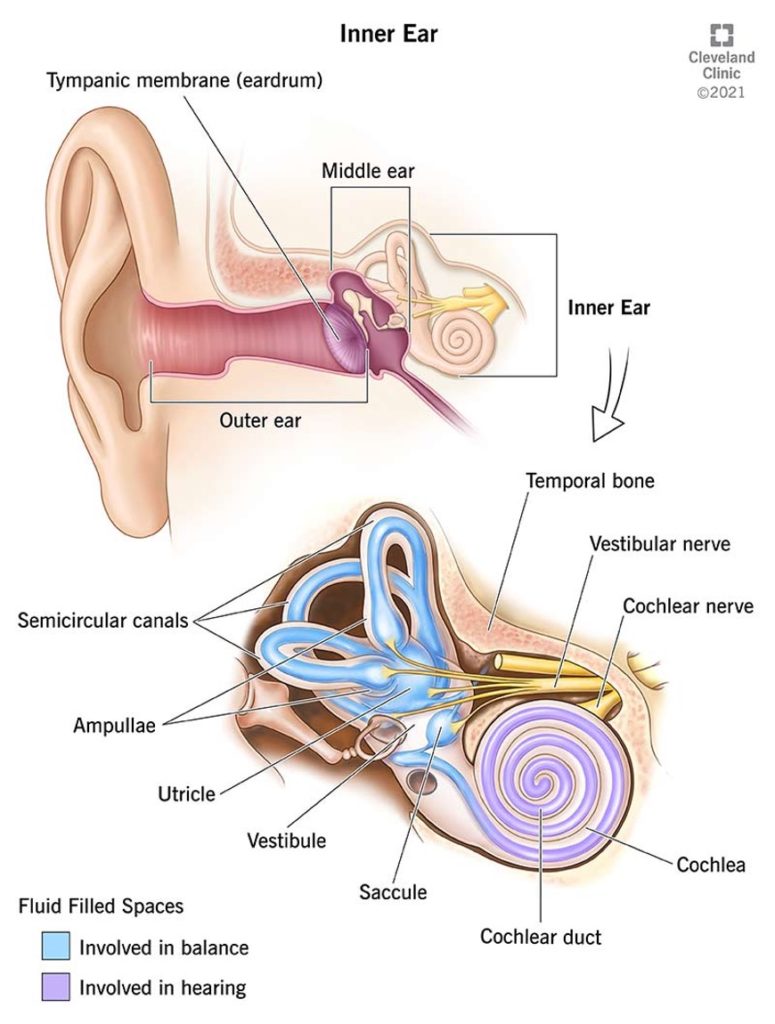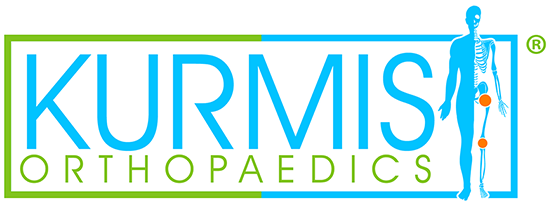‘Dizziness’ is a common term used to describe a large group of symptoms and sometimes it can be difficult to put these symptoms precisely into words. There are a wide range of terms used to describe dizziness and some of these include:
- Vertigo
- Spinning
- Nausea
- Imbalance
- Unsteadiness
- Light-headedness
- Floating or falling sensations
- Difficulty focussing vision
- Feeling ‘drunk’
- Feelings of a ‘surreal environment’ or ‘detachment’ from self
- Brain fog and difficulties concentrating
- Feeling unsteady or anxious in busy environments.
What is the most common cause of dizziness?
Many cases of dizziness are caused by problems that affect the balance mechanism in the inner ear (ie the vestibular system).
The vestibular system is made of five sensory organs (see diagram): three semi-circular canals and two otolith organs (utricle and saccule).
The purpose of the vestibular system is to monitor the position and motion of your head in space. The semi-circular canals are responsible for detecting rotation, for example when you nod or shake your head. The otolith organs are responsible for detecting motion along a line, for example when your car stops suddenly, or when you lean to one side.
Under normal circumstances, the inner ear structures send signals into areas of the brain, which are subsequently involved in co-ordinating movements of your eyes and head and are crucial in maintaining balance.

There are a range of disorders that commonly interfere with the functioning of the vestibular system and which can result in the types of symptoms described above. A few examples of common disorders involving the vestibular system are listed below:
- Benign Paroxysmal Positional Vertigo (BPPV) (a disorder caused by debris freely floating in the fluid of the inner ear);
- Vestibular Neuronitis or Labyrinthitis (a viral infection of the inner ear);
- Vestibular Migraine (a variant of classic migraine where the main symptom is of dizziness rather than headache);
- Acoustic Neuroma (a benign tumour which grows along the course of the vestibular nerve);
- Meniere’s Disease/ Endolymphatic Hydrops (a fluctuating disorder which involves the build-up of fluid in the inner ear);
- Stroke (an interference with the blood supply to the inner ear and vestibular areas within the brain);
- Trauma/ Concussion (motor vehicle accidents, significant falls);
- Persistent Postural Perceptual Dizziness (PPPD).

The onset of dizziness can vary. It may come on suddenly and intensely or slowly over time or after an illness or following an injury. Sudden severe dizziness does sometimes need an urgent medical assessment as it can be a sign of something serious such as a stroke that requires urgent treatment. Even once you have been seen by your GP or hospital doctors, you may still need some extra help if your dizziness persists.
How does dizziness affect the body?
For some people the impact of having a dizziness and balance problem is only annoying. For others, it can be a scary and debilitating experience that makes it difficult to walk, drive, read, work, and socialise. It is common to worry about the exact cause of the symptoms and whether the situation will improve. People with dizziness and balance issues have often had to modify their day-to-day activities in order to cope with their symptoms and this can lead to a range of additional issues from falls and physical deconditioning to headaches and financial pressures from reduced work hours. This can place added strain on relationships with family, friends and colleagues as well as causing feelings of reduced confidence, frustration, anxiety and depression.
What can be done to treat dizziness?
The good news is that many forms of dizziness can often be explained and resolved by accredited vestibular physiotherapists trained in vestibular rehabilitation. Vestibular rehabilitation is a specialised form of therapy designed to alleviate both the primary and secondary impairments related to a range of vestibular (inner ear) disorders. It often consists of an exercise-based program designed to reduce vertigo and dizziness, enhance gaze stability or visual focus, improve balance and stability and reduce the risk of falls. It may also include treatment of any secondary impairments that result from the vestibular disorder, such as neck pain and tension, headaches, nausea, fatigue, poor concentration and de-conditioning. Some certain types of dizziness also respond very well to repositioning manoeuvres that can be performed by the vestibular physiotherapist in the clinic.
The Physio Clinic has several accredited vestibular physiotherapists available who can assess your situation and guide you in your management. Each client receives a comprehensive and individualised assessment and advice on the role of vestibular rehabilitation in their management and recovery.
For more information or to book an initial appointment, please call The Physio Clinic on 8342 1233.























